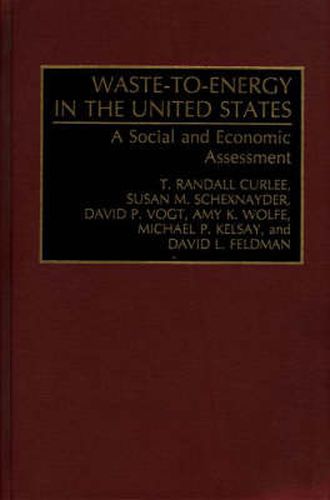Readings Newsletter
Become a Readings Member to make your shopping experience even easier.
Sign in or sign up for free!
You’re not far away from qualifying for FREE standard shipping within Australia
You’ve qualified for FREE standard shipping within Australia
The cart is loading…






This book presents the first comprehensive and unbiased assessment of the social and economic factors that drive decisions about waste-to-energy (WTE) projects in the United States. Information about each WTE project initiated between 1982 to 1990 is combined with detailed socioeconomic data at the county level to identify the social and economic differences between counties that have completed WTE facilities and counties that have abandoned their projects during the planning process. To examine the effects of political objectives, public attitudes, and the decision process itself, the book reports on four in-depth case studies–two directed at communities that have accepted WTE and two that have canceled WTE projects. The book also discusses the potential health and environmental risks posed by WTE and alternative waste practices, legislative initiatives and regulatory uncertainties, and the potential for energy production from burning our municipal waste.
Municipal solid waste (MSW) incineration, commonly called waste-to-energy (WTE), was adopted by many U.S. communities during the 1980s and now is used to manage about 16% of all U.S. MSW. Many experts forecasted that WTE would be used to manage as much as half of all garbage by the turn of the century. Those forecasts and the long-run viability of WTE are now challenged by massive cancellations of WTE projects across the United States. Between 1986 and 1990, 207 WTE projects were abandoned, compared to only 140 operational facilities in 1990.
Why have these cancellations occurred, and what do they tell us about the long-run viability of WTE? This book addresses these questions and presents the first comprehensive and unbiased assessment of the social and economic factors that drive decisions about WTE in the United States. The book adopts a three-pronged approach to investigate (1) the relationships between a community’s decision about WTE and the social and economic characteristics of that community, (2) the impacts of recent changes in financial markets on the viability of WTE, and (3) the decision-making process by which communities decide about WTE. The first two objectives are met by the collection and analysis of data on all U.S. WTE projects from 1982 to 1990. The latter objective is met by way of four in-depth case studies–two directed at communities that have accepted WTE and two that have canceled WTE projects. The book also discusses the potential health and environmental risks posed by WTE and alternative waste practices, legislative initiatives and regulatory uncertainties, and the potential for energy production from burning our municipal waste.
$9.00 standard shipping within Australia
FREE standard shipping within Australia for orders over $100.00
Express & International shipping calculated at checkout
Stock availability can be subject to change without notice. We recommend calling the shop or contacting our online team to check availability of low stock items. Please see our Shopping Online page for more details.
This book presents the first comprehensive and unbiased assessment of the social and economic factors that drive decisions about waste-to-energy (WTE) projects in the United States. Information about each WTE project initiated between 1982 to 1990 is combined with detailed socioeconomic data at the county level to identify the social and economic differences between counties that have completed WTE facilities and counties that have abandoned their projects during the planning process. To examine the effects of political objectives, public attitudes, and the decision process itself, the book reports on four in-depth case studies–two directed at communities that have accepted WTE and two that have canceled WTE projects. The book also discusses the potential health and environmental risks posed by WTE and alternative waste practices, legislative initiatives and regulatory uncertainties, and the potential for energy production from burning our municipal waste.
Municipal solid waste (MSW) incineration, commonly called waste-to-energy (WTE), was adopted by many U.S. communities during the 1980s and now is used to manage about 16% of all U.S. MSW. Many experts forecasted that WTE would be used to manage as much as half of all garbage by the turn of the century. Those forecasts and the long-run viability of WTE are now challenged by massive cancellations of WTE projects across the United States. Between 1986 and 1990, 207 WTE projects were abandoned, compared to only 140 operational facilities in 1990.
Why have these cancellations occurred, and what do they tell us about the long-run viability of WTE? This book addresses these questions and presents the first comprehensive and unbiased assessment of the social and economic factors that drive decisions about WTE in the United States. The book adopts a three-pronged approach to investigate (1) the relationships between a community’s decision about WTE and the social and economic characteristics of that community, (2) the impacts of recent changes in financial markets on the viability of WTE, and (3) the decision-making process by which communities decide about WTE. The first two objectives are met by the collection and analysis of data on all U.S. WTE projects from 1982 to 1990. The latter objective is met by way of four in-depth case studies–two directed at communities that have accepted WTE and two that have canceled WTE projects. The book also discusses the potential health and environmental risks posed by WTE and alternative waste practices, legislative initiatives and regulatory uncertainties, and the potential for energy production from burning our municipal waste.